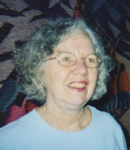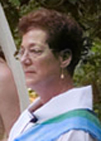By Liz Garrigan
Nashville Scene
February 10, 2010
http://blogs.nashvillescene.com/pitw/2010/02/another_event_you_wont_read_ab.php
 |
| Joan Houk |
The group of local Catholics called Anawim--a word from the Hebrew scriptures for "the poor" or "lost and forgotten ones"--are among those hosting a talk tonight at Vanderbilt that would send Nashville Bishop David Choby right to his Rosary.
But having been here before, Anawin didn't even try to book a local parish for the meeting venue. Instead, the talk titled "Prophetic Obedience: The Experience and Vision of Roman Catholic Womanpriests" will be at the Vanderbilt Divinity School (in the arts room on the ground floor) at 8 p.m.
Bishop Joan Houk will be subbing for Andrea Johnson, who is snowbound in Annapolis. Both are women who have been ordained by Catholic bishops, but neither are recognized by Rome as rightful priests or church leaders. Quite obviously, Houk's talk will focus on why the church's hidebound adherence to celibate male priests serves only to limit Catholicism's reach and charitable influence in a country (and world) where there is a troubling shortage of clergy and where more and more community parishes are priestless.
"We feel that canon law, which does not represent the people at all -- only a few guys in Rome -- is unjust," Johnson tells Pith. "We're breaking canon 1024. Like Rosa Parks, we're saying, 'No, we are not going to sit on the back of the bus.' "
A student of church history with all manner of impressive degrees, Johnson (like her comrade-in-arms, Houk) notes that in the church's early days, then starting again in the 1940s and during the Cold War, the Catholic Church sponsored clandestine churches and clergy that were not known above ground -- simply as a means to continue the church.
 |
| Andrea Johnson |
"The Vatican was aware of all this stuff," Johnson says. "They began to ordain a lot of people that current canonical regulations do not permit, like married men and women. So we know that this has happened in the 20th century.... They're still doing it in China as we speak."
What Johnson, Houk and many other women are trying to do is build a new model of priesthood so that more people can give the Eucharist and serve both the faith and social justice, which are central to Catholicism.
"The movement is not just about getting women ordained, although that is a very important issue -- not just as a matter of fairness but because there aren't enough priests to go around. It's about the fact that the structures need to change."
Some might wonder why people who loathe the institution's strictures would even want to continue being part of the church.
"We are inside the church because we believe the church is good," Johnson says. "It is all of us, and it it our commitment to living the gospel. We just want to make it better. We want to show a new way of ordained ministry."
The event is being co-sponsored by the Vanderbilt Office of Women's Concerns, the Vanderbilt Carpenter Program in Religion, Gender and Sexuality, the Vanderbilt Office of Religious Life and the Society of St. Cornelius. Next Thursday, Feb. 18, there will be a panel discussion about recent ordination controversies in Christian denominations. It will be 4-5:30 p.m. in Room G-23 of the Vanderbilt Divinity School. Panelists will include Patout Burns (Edward A. Malloy Professor of Catholic Studies, VDS), M. Douglas Meeks (Cal Turner Chancellor's Chair of Wesleyan Studies, VDS), Ted Smith (Assistant Professor of Ethics and Society, VDS) and Eileen Campbell-Reed (Associate Director, Learning Pastoral Imagination Project, Luther Seminary). Ellen T. Armour (E. Rhodes and Leona B. Carpenter Chair in Feminist Theology, VDS) will moderate.
Any original material on these pages is copyright © BishopAccountability.org 2004. Reproduce freely with attribution.